Tomorrow, Tomorrow, Insha-Allah
A true story by Sara Cheikh
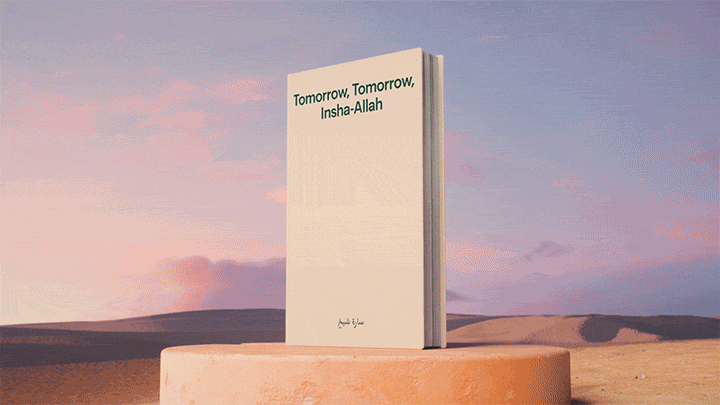
Out now!
The story told in the book gets complemented by this audiovisual online archive.
ONE MONTH
IN MHEIRIZ
Chapter 03RETURN TICKET
[ENG] Yusef's sense of humour makes us downplay the fact that we are not going to have dinner, and we may not have anything to eat tomorrow either. It is already dark. Emir and Salma, Fatma's children, are chasing birds. It is the first time I have seen such small birds in the desert.
"They are turtle doves, and it would do us good to eat their meat," says Gali.
"He's joking," I think to myself.
Ten minutes later, we're all in the Land Rover, trying to hit these birds. In a normal context, I'd think it'd be a savage thing to kill these little things. On an empty stomach, I forget that I'm vegetarian and give Gali directions so that he can run over our future food.
Five of them succumb to the blows of the car. Sidi Buya and Gali finish off the stunned birds with a halal sacrifice: they both pronounce "Bismillah" before killing the animals. The procedure is performed with the bird facing Mecca. Sidi Buya grabs the bird by the neck while Gali inflicts a quick incision with a sharp blade on the throat, severing the jugular and carotid arteries. The essence of the sacrifice is that the animal's suffering is minimised.
The hunt is productive. I'm not sure if the five birds will be enough for the ten mouths, but we're not here to complain.
[ESP] El sentido del humor de Yusef nos hace quitarle importancia al hecho de que no vamos a cenar. Puede que tampoco tengamos para comer mañana.
Ya es de noche. Emir y Salma, los hijos de Fatma, persiguen unos pájaros. Es la primera vez que veo aves tan pequeñas en el desierto.
—Son tórtolas, y nos vendría muy bien comernos su carne —dice Gali.
«Está de coña», pienso. Diez minutos después, estamos todos en el Land Rover, intentando atropellar pajarillos. En un contexto normal, me parecería una salvajada matar estas cositas. Con el estómago vacío, se me olvida que soy vegetariana y le doy indicaciones a Gali para que atine a arrollar nuestra futura comida.
Cinco sucumben a los golpes del coche. Sidi Buya y Gali acaban de rematar a las tórtolas aturdidas con un sacrificio halal: Ambos pronuncian bismillah antes de acabar con la vida del animal. El procedimiento se realiza con el ave mirando hacia la Meca. Sidi Buya agarra al pájaro del cuello mientras Gali inflige una rápida incisión con una cuchilla afilada en la garganta, cortando la yugular y la carótida. La esencia del sacrificio es que se minimiza el sufrimiento del animal.
La caza es productiva. No estoy segura de que cinco pájaros sean suficientes para las diez bocas que somos, pero tampoco estamos aquí para quejarnos.
Hace seis días que practicamos el arte de la espera. Debe de ser la una de la tarde. Sidi Buya ha perdido su inusual buen humor de los primeros días. Las noches de frío, la insuficiencia de alimentos y la frustración de no saber cuándo podremos salir de aquí han afectado a su estado emocional.
Después de casi una semana de no hacer nada, Nora accede a amasar la mezcla de harina y agua. Yusef enciende una hoguera para calentar la tierra y meter la masa de pan bajo la arena para que se cueza. Gali sirve un plato de tórtolas con pan mojado para los hombres y otro para nosotras y los pequeños Salma y Emir.
"They are turtle doves, and it would do us good to eat their meat," says Gali.
"He's joking," I think to myself.
Ten minutes later, we're all in the Land Rover, trying to hit these birds. In a normal context, I'd think it'd be a savage thing to kill these little things. On an empty stomach, I forget that I'm vegetarian and give Gali directions so that he can run over our future food.
Five of them succumb to the blows of the car. Sidi Buya and Gali finish off the stunned birds with a halal sacrifice: they both pronounce "Bismillah" before killing the animals. The procedure is performed with the bird facing Mecca. Sidi Buya grabs the bird by the neck while Gali inflicts a quick incision with a sharp blade on the throat, severing the jugular and carotid arteries. The essence of the sacrifice is that the animal's suffering is minimised.
The hunt is productive. I'm not sure if the five birds will be enough for the ten mouths, but we're not here to complain.
[ESP] El sentido del humor de Yusef nos hace quitarle importancia al hecho de que no vamos a cenar. Puede que tampoco tengamos para comer mañana.
Ya es de noche. Emir y Salma, los hijos de Fatma, persiguen unos pájaros. Es la primera vez que veo aves tan pequeñas en el desierto.
—Son tórtolas, y nos vendría muy bien comernos su carne —dice Gali.
«Está de coña», pienso. Diez minutos después, estamos todos en el Land Rover, intentando atropellar pajarillos. En un contexto normal, me parecería una salvajada matar estas cositas. Con el estómago vacío, se me olvida que soy vegetariana y le doy indicaciones a Gali para que atine a arrollar nuestra futura comida.
Cinco sucumben a los golpes del coche. Sidi Buya y Gali acaban de rematar a las tórtolas aturdidas con un sacrificio halal: Ambos pronuncian bismillah antes de acabar con la vida del animal. El procedimiento se realiza con el ave mirando hacia la Meca. Sidi Buya agarra al pájaro del cuello mientras Gali inflige una rápida incisión con una cuchilla afilada en la garganta, cortando la yugular y la carótida. La esencia del sacrificio es que se minimiza el sufrimiento del animal.
La caza es productiva. No estoy segura de que cinco pájaros sean suficientes para las diez bocas que somos, pero tampoco estamos aquí para quejarnos.
Hace seis días que practicamos el arte de la espera. Debe de ser la una de la tarde. Sidi Buya ha perdido su inusual buen humor de los primeros días. Las noches de frío, la insuficiencia de alimentos y la frustración de no saber cuándo podremos salir de aquí han afectado a su estado emocional.
Después de casi una semana de no hacer nada, Nora accede a amasar la mezcla de harina y agua. Yusef enciende una hoguera para calentar la tierra y meter la masa de pan bajo la arena para que se cueza. Gali sirve un plato de tórtolas con pan mojado para los hombres y otro para nosotras y los pequeños Salma y Emir.
Extract from the book / Extracto del libro

From left to right: Sidi buya in green military uniform, Yousef in beige military uniform, Gali with the colourful turban and Brahim lying down waiting for the car to be fixed on our first night on the way to “The Bone of The Wind”. Liberated territories of Western Sahara, April 2020.

Nora and Leila talk to Brahim while Sidi Buya, Yousef and Gai fix the car. Liberated territories of Western Sahara, April 2020.



My travel companions and I photographed by Brahim. Liberated territories of Western Sahara, April 2020.

Brahim helping Gali fix a wheel. Liberated territories of Western Sahara, April 2020.
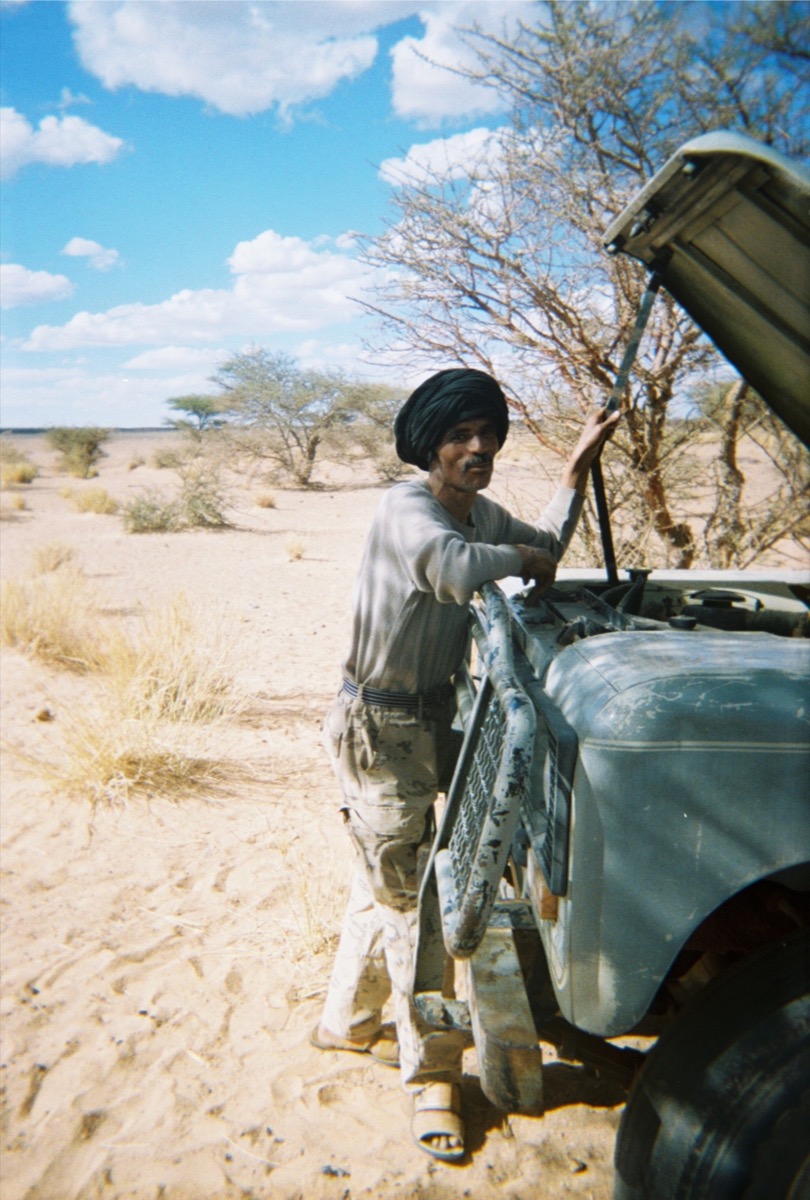
Yousef checking the car's engine on the way “The Bone Of The wind” . Liberated territories of Western Sahara, April 2020.

Lunch break on the way to “The Bone Of The wind”. Liberated territories of Western Sahara, April 2020.

Brahim resting on a stone after having brought us wood for the fire. Liberated territories of Western Sahara, April 2020.
Leila posing with a camel on the road to “The bone Of The Wind”. Liberated territories of Western Sahara, April 2020.
Yousef, Gali and Sidi Buya changing one wheel one way to “The bone Of The Wind”. Liberated territories of Western Sahara, April 2020.

Algerian soldiers guarding the border with a sand wall. “The Bone Of The Wind”, April 2020.
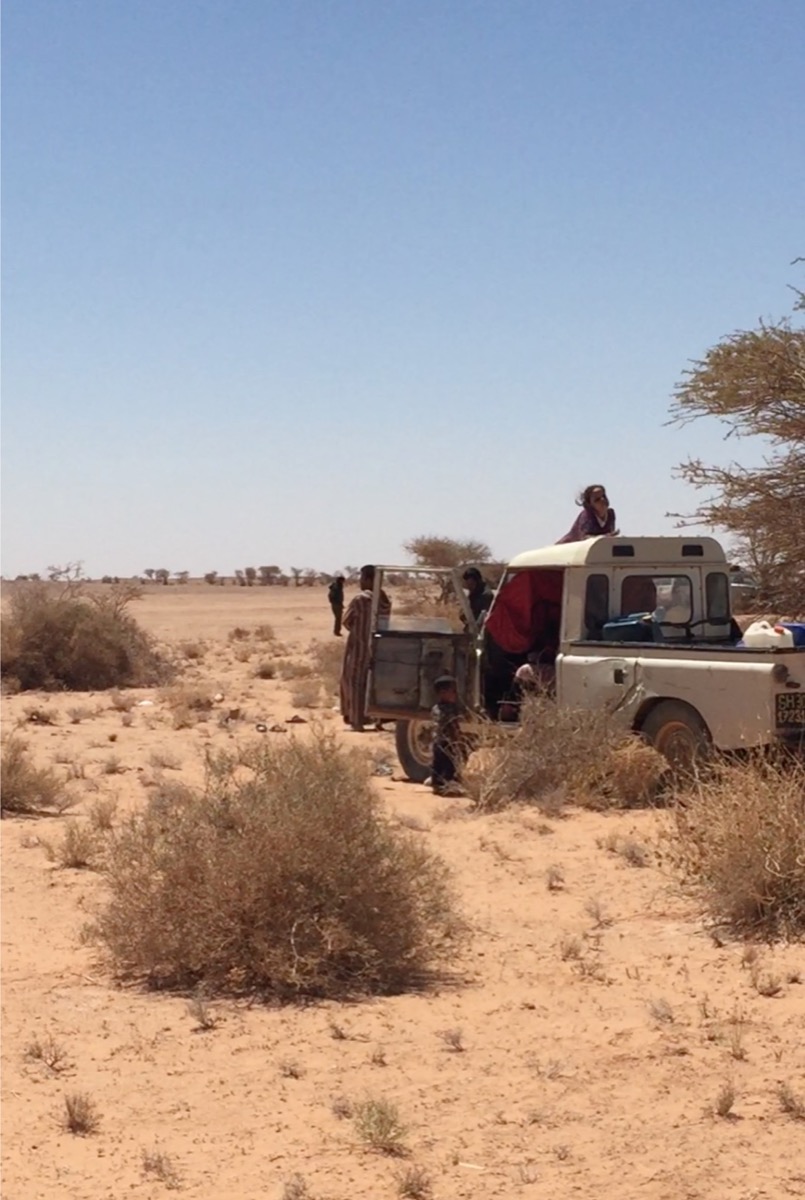
The family of Ahmed, our neighbour in “The Bone Of The Wind”, April 2020.

Sidi buya and Gali sacrificing the birds that we would eat the next day. “The Bone Of The Wind”, April 2020.
Yousef baking bread in the sand. “The Bone Of The Wind”, April 2020.
 Brahim making tea with yousef, Nora and Leila, in the same place where we slept. “The Bone Of The Wind”, April 2020.
Brahim making tea with yousef, Nora and Leila, in the same place where we slept. “The Bone Of The Wind”, April 2020.Makeshift camp 30 km from “The Bone of The Wind”, April 2020.
Selma singing in front of the jama where we slept , April 2020.

Emir playing with the children in the makeshift camp 30 km from “The Bone of The Wind”. April 2020.
Khaled on top of burki's car helping Gali to assemble our bags, hours before leaving the "waiting camp". April, 2020.

Caravan of cars waiting to cross the border to the camps. April, 2020.
Khaled helping his uncle Burki to change the wheel a few metres after passing “The Bone of Te Wind”. April, 2020.
Burki waiting in the shade for someone to come by and help us with our broken down car. April, 2020.
Emir and Selma play on the road while Fatma calls her husband to send us a wheel. Between Customs and the refugee camps. April 2020.


Photo of my father (in the center in camouflage uniform) with his colleagues at MINURSO (United Nations mission for Western Sahara) with annotations on them on the back. April 1993.
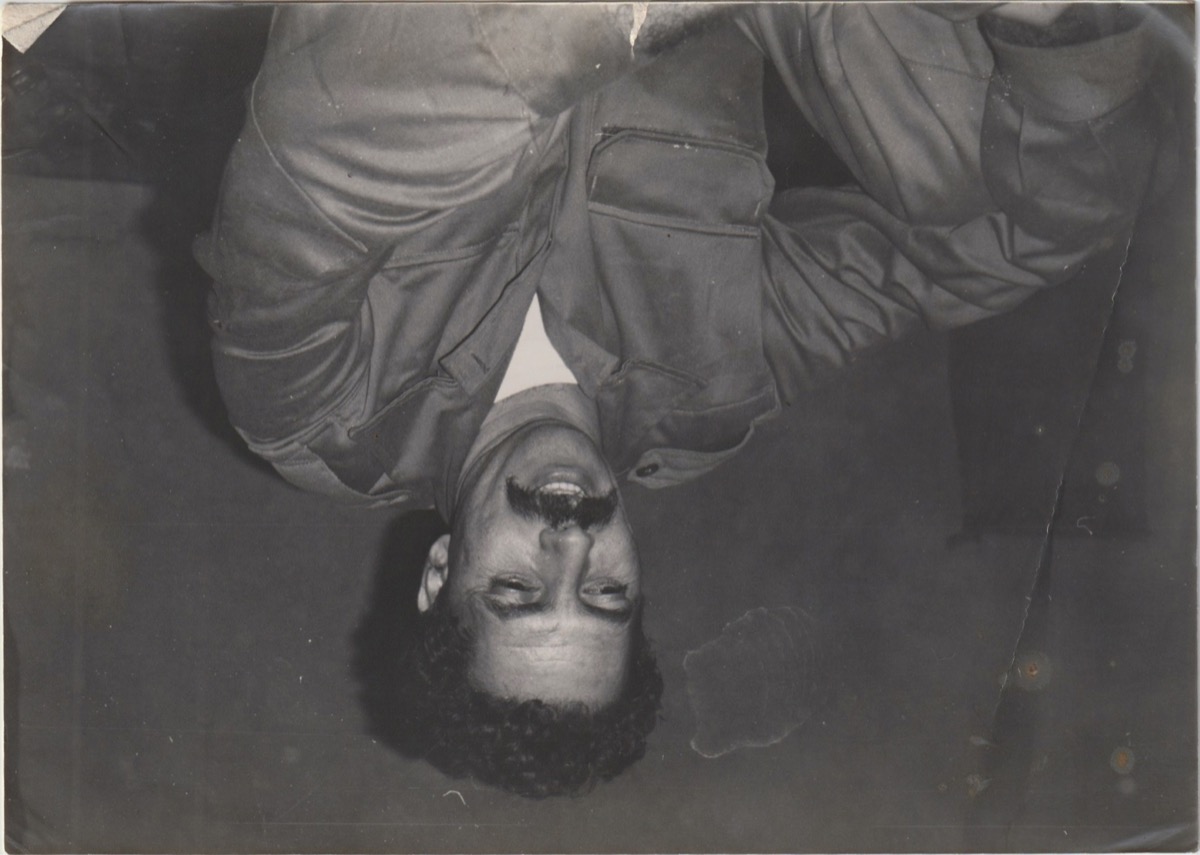
After his five years as a political prisoner during the war, my father rejoined the Polisario Front. Photo taken by my mother on one of her visits to the camps in 1991.
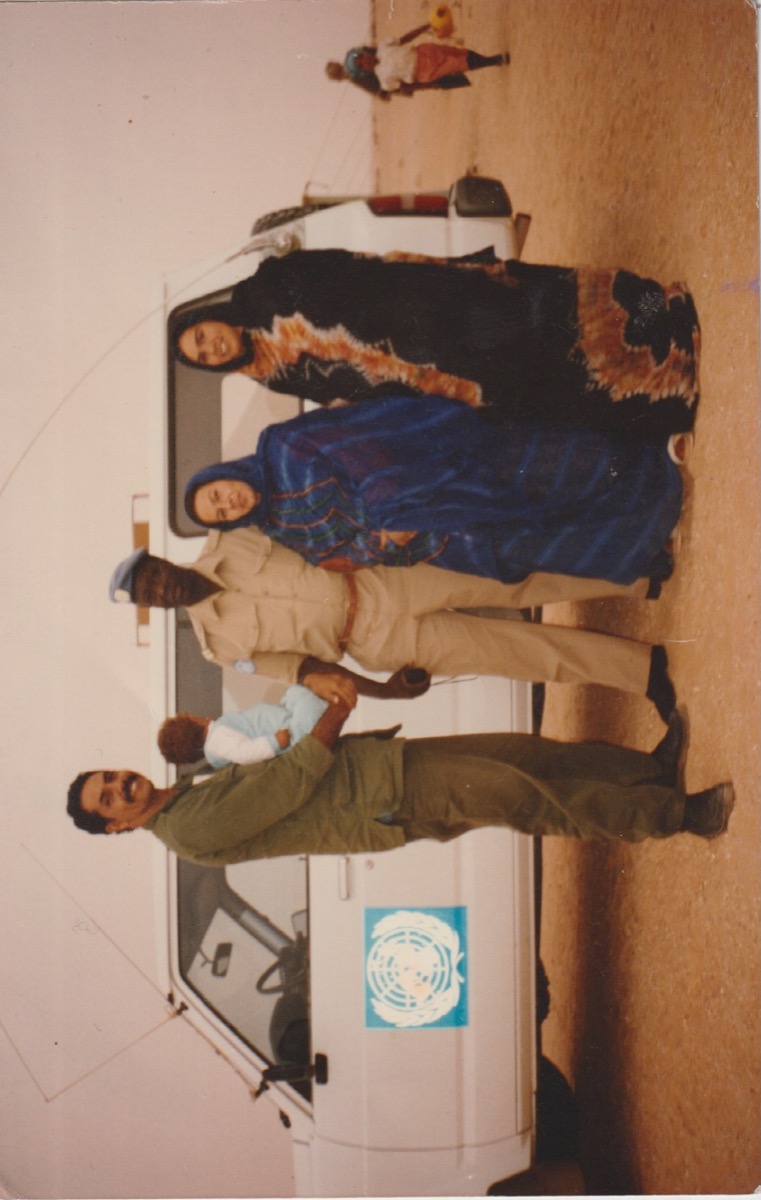
My father with my brother Musa in his arms and his Guinea-Conakri Collegue from UN mission, MINURSO, during a visit to the camps. On the right my mother (right) and my aunt Nayat. Smara, refugee camps in Tundouf, Algeria, 1991.

Leila and Nora praying to cross the border into Tunduf, and Nora seconds after veryfing we have entered Tindouf. April 2020.

Younes making his stop to cut the fast on our first day of the trip. May 2020.
Younes repairing the wheel the morning after our accident near Béchar, Algeria, May 2020.

The security guard of the public building, in the moments when he doubted his true identity... Béchar, Algeria, May 2020.
Younes picking up his blanket after a nap. Naama, Algeria, May 2020.
Moments after fleeing the train station in Frankfurt, May 2020.
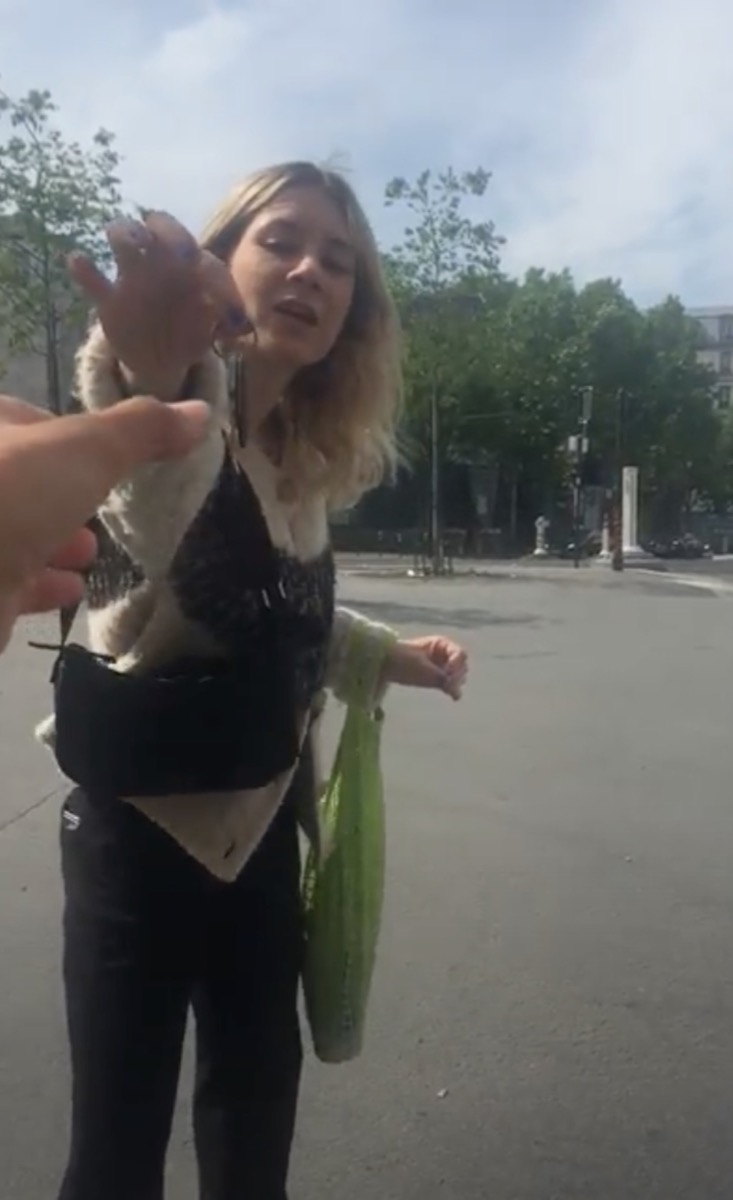
Marie handing me my keys while keeping a safe distance. Paris, May 2020